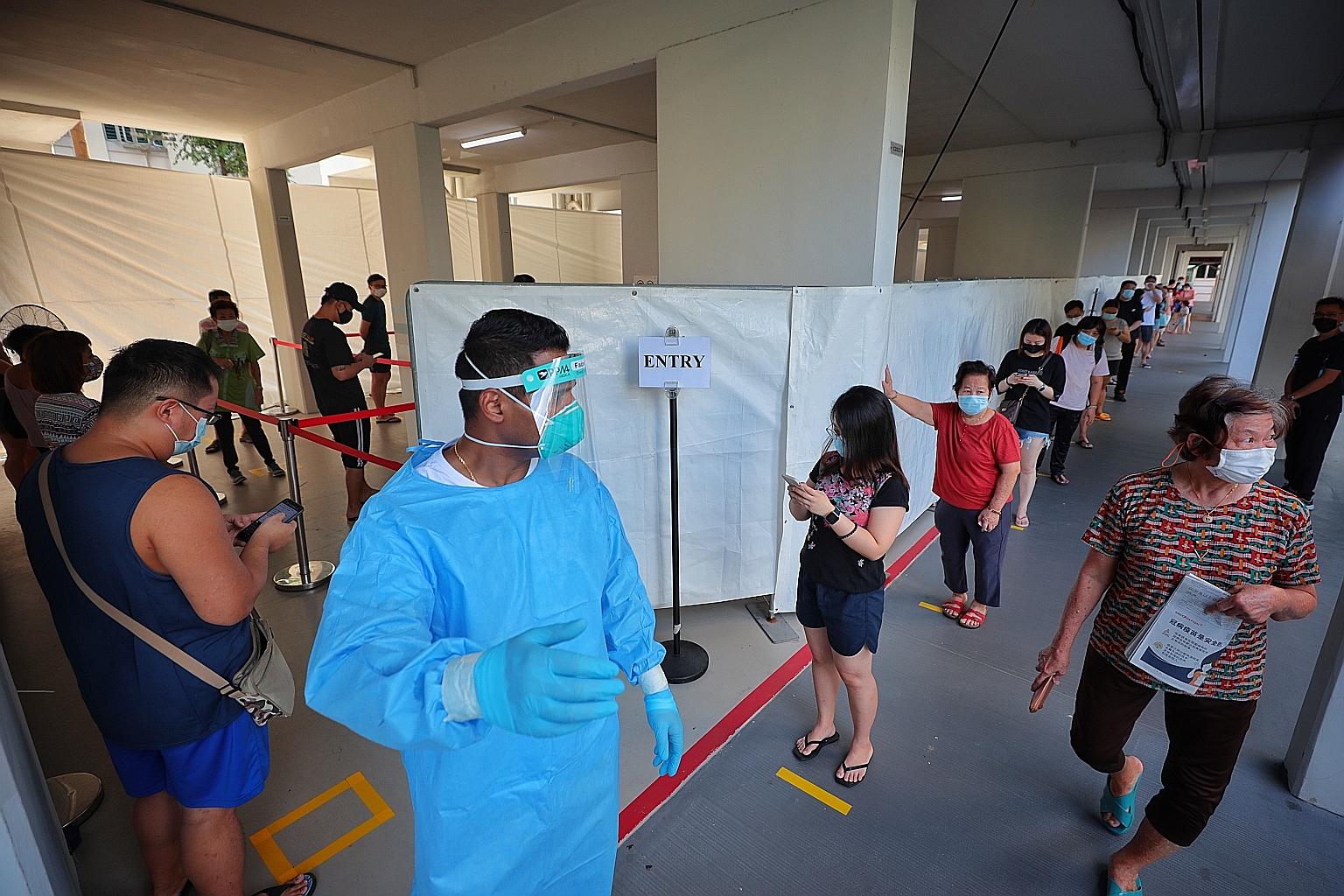Coronavirus: Singapore
Highly unlikely virus spread through sewage system, say experts
Contaminated surfaces as well as residents visiting nearby blocks more likely means of infection
Sign up now: Get ST's newsletters delivered to your inbox

Residents of Blocks 501 and 507 in Hougang Avenue 8 queueing up for Covid-19 testing yesterday at the void deck of Block 507. The residents were informed about the mandatory testing on Monday, after Covid-19 viral fragments were detected in wastewater samples collected from the blocks.
ST PHOTO: JASON QUAH
Debunking fears that the detection of the coronavirus in wastewater at residential blocks means that Covid-19 is being spread between blocks through the sewage system, infectious disease experts and national water agency PUB said yesterday it is highly unlikely that residents can catch Covid-19 via the wastewater system.
On Monday, all residents of two Housing Board blocks in Hougang - 501 and 507 in Avenue 8 - were informed that they would have to go for mandatory tests after Covid-19 viral fragments were detected in wastewater samples collected from the blocks.
The two blocks are within the same area as Block 506 Hougang Avenue 8, which saw its residents mass-tested for the virus after a few of its residents were found to have Covid-19.
Professor Paul Tambyah, president of the Asia-Pacific Society of Clinical Microbiology and Infection, said: "Detection of Covid-19 fragments in wastewater does not mean that was the mode of transmission - it is a screening tool to pick up the presence of individuals who are shedding the virus."
In response to queries, a PUB spokesman said that sanitary systems here are "closed systems", where the pipes are airtight and watertight to ensure that no foul air, viruses or bacteria can travel between households or blocks.
Professor Dale Fisher, an infectious disease expert at the National University of Singapore (NUS), said that the infected residents of Block 506 may have transmitted Covid-19 to their neighbours in Blocks 501 and 507 through other means, such as contaminated surfaces.
Professor Teo Yik Ying, dean of NUS' Saw Swee Hock School of Public Health, said: "It could be that there are people who are asymptomatically infected in these blocks, and we should not rule out the possibility of false detection as well.
"It is otherwise too early to speculate how the Covid-19 fragments could have been detected if there are truly no infected cases in these blocks."
Rather than viral spread through the sewage system, Prof Tambyah said that "it is far more likely that people living in adjacent blocks visited one another, and thus, the wastewater surveillance picked up the positive cases in the adjacent blocks".
Testing for residents in the two blocks began yesterday and will end tomorrow.
When The Straits Times arrived at Block 507 in Hougang at about 9am yesterday, testing was in full swing and residents had formed a queue to get swabbed.
Madam Koh Beng Hup, who works in a McDonald's outlet, said: "I am not worried about myself because I feel fine. But I am worried that someone in the block might have the virus.
"I have always been a careful person. I wash my hands when leaving home or coming back."
The 60-year-old added that the swabbing process took only about five minutes from start to finish.
Over at Block 745 Yishun Street 72, testing was also under way for residents.
The Ministry of Health had announced the tests on Monday after six Covid-19 cases were detected in the Yishun block, with subsequent wastewater tests detecting virus fragments. Testing for the block's residents will end today.
Separately, the National Environment Agency (NEA), which is in charge of wastewater testing for Covid-19, said that as at last month, it had expanded the wastewater surveillance programme to about 110 locations.
These include Singapore's four water reclamation plants, workers' dormitories and other high-population-density living premises such as nursing homes and student hostels.
"We continually assess the situation together with other agencies on wastewater surveillance points to complement clinical testing," said an NEA spokesman.


